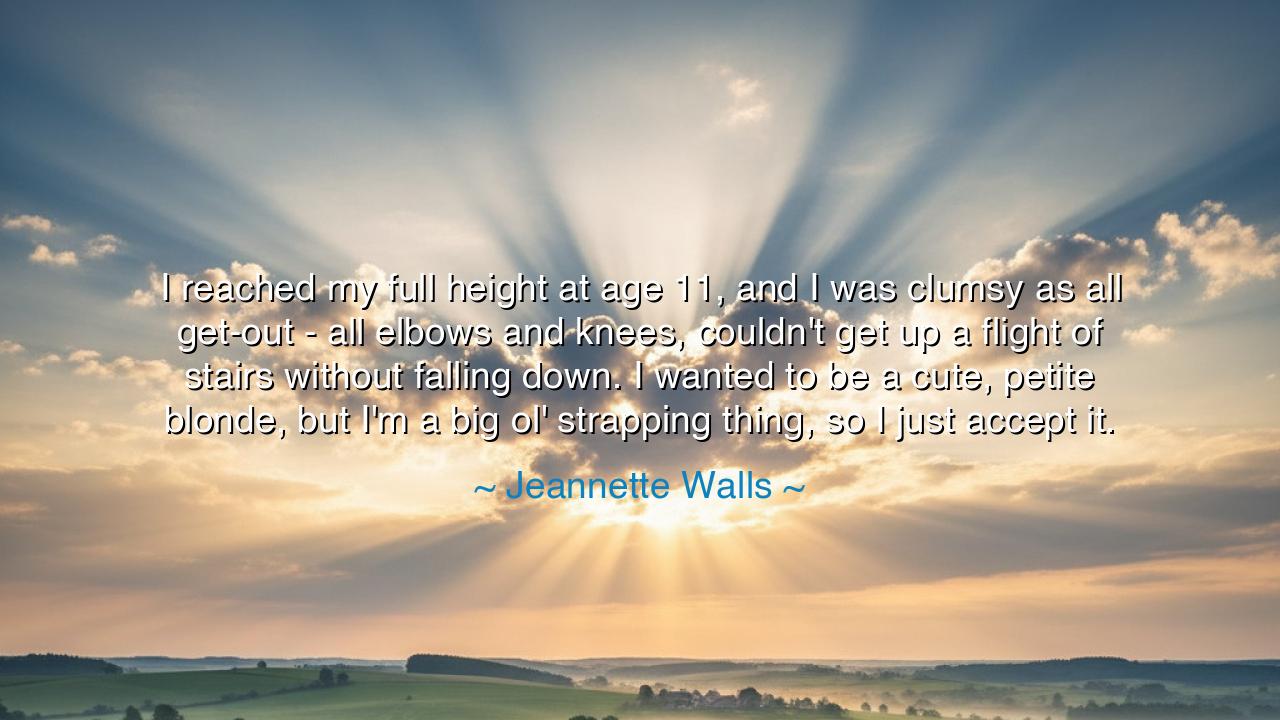
I reached my full height at age 11, and I was clumsy as all
I reached my full height at age 11, and I was clumsy as all get-out - all elbows and knees, couldn't get up a flight of stairs without falling down. I wanted to be a cute, petite blonde, but I'm a big ol' strapping thing, so I just accept it.






The words of Jeannette Walls—“I reached my full height at age 11, and I was clumsy as all get-out—all elbows and knees, couldn’t get up a flight of stairs without falling down. I wanted to be a cute, petite blonde, but I’m a big ol’ strapping thing, so I just accept it.”—speak not only of youthful awkwardness but of a greater and nobler truth: the acceptance of one’s nature. Within her humor lies the essence of wisdom—that peace does not come from becoming what we wish, but from embracing what we are. These are the words of a woman who has wrestled with self-image, as all humans do, and has emerged not with bitterness but with grace. It is a declaration that the path to confidence begins not in imitation, but in self-recognition.
Walls, the author of The Glass Castle, is a woman who has known both struggle and transformation. Her childhood was marked by instability, poverty, and constant change, yet it forged within her a resilience as unyielding as iron. When she speaks of her height and clumsiness, she does not merely describe the discomforts of adolescence; she speaks of the universal pain of difference—the longing to belong in a world that prizes conformity. At age 11, she found herself taller, larger, and less “graceful” than what she thought society expected of a girl. The world told her she should be petite, delicate, and polished. Instead, she was strong, awkward, and raw. And so she learned what all must learn in time: that the measure of beauty is not comparison, but acceptance.
The ancients, too, knew the torment of wanting to be other than what one is. In the myths of Greek philosophy, there is the tale of Narcissus, who gazed into the pool and fell in love with his reflection—yet it was not love, but imprisonment. He could not accept what was real; he worshiped the illusion instead, and it consumed him. Jeannette Walls, in contrast, turns away from the illusion. She refuses to worship what she is not. When she says, “I just accept it,” she speaks the words that free the soul from the mirror’s tyranny. To accept oneself—in body, in shape, in temperament—is to reclaim one’s freedom from the world’s false idols of perfection.
There is beauty, too, in her humility and humor. She describes herself as “all elbows and knees,” a phrase both tender and self-deprecating, yet radiant in its humanity. For to laugh at one’s flaws is to diminish their power; to acknowledge them is to rob them of their sting. The ancient Stoics would have called this the virtue of equanimity—the calm acceptance of what cannot be changed. The philosopher Epictetus taught that serenity comes not from reshaping the world, but from aligning oneself with it. In her own way, Walls embodies this teaching. Instead of striving to be small in a world that often tells women to shrink themselves, she chooses to stand tall—to be a “big, strapping thing,” unapologetically present in her skin.
Consider also the life of Abraham Lincoln, who was mocked in his youth for his gangly frame and awkward gait. He was, as one observer described, “all arms and legs,” yet he did not allow such ridicule to define him. In time, his very stature became a symbol of dignity and strength. So it is with Jeannette Walls: what once felt clumsy and ungainly became the foundation of confidence. Her physical height mirrors her inner height, her capacity to rise above hardship and walk through the fires of self-doubt into acceptance. The lesson she teaches is not about beauty, but about authenticity—about finding peace not in perfection, but in truth.
In her acceptance, there is also an act of defiance. The world profits from our insecurities, whispering that we must change, that we must strive endlessly to meet an imagined ideal. But Walls refuses that command. She shows that to love oneself as one is—to laugh at one’s awkwardness and wear it proudly—is a quiet act of rebellion. It is to stand against the tide of false comparison and say, “I am enough.” This is not arrogance, but liberation—the freedom that comes when self-acceptance replaces self-criticism. She reminds us that our flaws, whether physical or emotional, are not weaknesses but signatures of our humanity.
So let this be the teaching, O listener: acceptance is the highest form of wisdom. When you cease to fight who you are, you begin to live freely. The body you inhabit, the face you wear, the manner in which you move through the world—these are not errors to be corrected, but expressions of your uniqueness. Do not waste your years chasing another’s reflection; stand in your own light, even if it casts a different shape. Cultivate humor in your imperfections and gratitude in your differences, for they are the brushstrokes that paint your individuality.
In the end, Jeannette Walls shows us that true beauty begins the moment we stop wishing to be someone else. Her journey from clumsiness to confidence is not just her own—it is the story of every soul learning to walk tall in its own truth. Embrace yourself, in all your “elbows and knees,” your awkwardness and power, your flaws and your fire. For when you do, you will find that the very things you once wished away are the same things that make you unrepeatable, unshakable, and whole.






AAdministratorAdministrator
Welcome, honored guests. Please leave a comment, we will respond soon